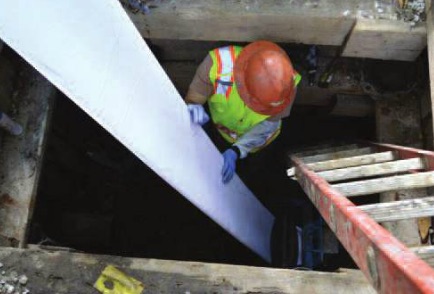Chicago’s Department of Water Management (DWM) has launched two pilot programs that will allow the city to leverage alternative pipe replacement technologies, lessening the impact of water pipeline repair construction on the community and the environment at large.
“Chicago must always provide high-quality water to our residents and uphold environmental protection in our neighborhoods, which is why the City is conducting these pilot studies,” Mayor Lori Lightfoot said in a statement. “These pilot programs underscore my administration’s commitment to listen to the concerns of residents and determine the feasibility of innovative methods that could replace our current practices.”
The pilots will investigate the use of pipe lining technologies to rehabilitate water mains and private drains in place of open trench replacement with the goal of limiting tree removal where underground water infrastructure projects are planned.
“The Department of Water Management remains committed to protecting water quality and responding to the needs of the communities we serve,” said Commissioner Randy Conner. “We are excited to expand our approach to results-driven construction practices based on the findings of these pilots.”
The first pilot will investigate the use of cured-in-place pipe (CIPP) for the rehabilitation of water mains. This comes after the Chicago Department of Water Management (DWM) has used CIPP in recent years to extend the useful life of sewer mains.
In the CIPP process, a resin-soaked textile liner tube is pulled through an existing pipe and allowed to harden. As the resin cures, it forms a tight-fitting, jointless and corrosion-resistant replacement pipe. The liner can be inserted using water or air pressure and only requires digging access points for entry and end points, far less disruptive than traditional “dig and replace” pipe repair.
“It is critical that the City of Chicago reviews alternate approaches to installations of water mains that will ensure water quality for our residents. There has been tremendous concern about protecting the old-growth trees in my ward, “said Alderman Harry Osterman.
The second pilot study will assess the rehabilitation of private drains using various pipe lining materials. Private drains are the pipes that move wastewater from a residence to the sewer main in the street. While it is anticipated that this pilot will reduce the impact to surrounding trees, any underground construction can result in regulation-mandated tree removal. This is more likely with private drain work, as the drains usually run from a residence under the parkway and out to the sewer main.
“If we can find a solution to tree removal while also saving money, I think it’s a win for everyone,” said Alderman Andre Vasquez. “These pilot programs will allow us to study and analyze our options in the hope of creating a plan that spares trees and hassle for my constituents.”
Independent consultants will conduct the pilots, analyze the results and make recommendations about using the tested technologies moving forward. Both pilots will be conducted in compliance with Chicago Plumbing Code and State regulations for water infrastructure construction, while avoiding any negative impact on water quality. DWM will work with stakeholders to determine locations for both pilots, and results are expected to be available by the end of 2020.
The Department of Water Management has been aggressively working to replace Chicago’s aging water infrastructure. Since 2012, DWM has replaced 716 miles of water main, 167 miles of sewer mains and lined 403 miles of sewer main to create a more reliable and efficient water system.
# # #
Home : Disclaimer : Privacy Policy : Web Standards : Site Credits : Site Map : Contact Us : Press Room : Website Feedback
Copyright © 2010 – 2019 City of Chicago






